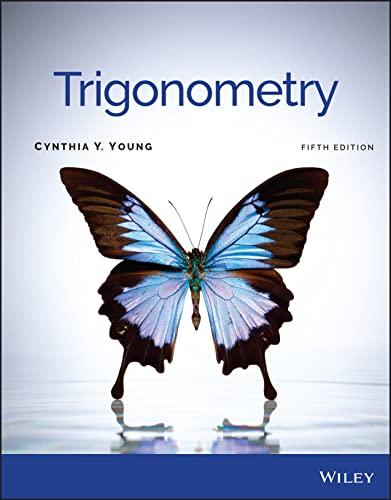Question
1) The National Longitudinal Study of Adolescent Health interviewed several thousand teens (grades 7 to 12). One question asked was What do you think are
1) The National Longitudinal Study of Adolescent Health interviewed several thousand teens (grades 7 to 12). One question asked was "What do you think are the chances you will be married in the next 10 years?" Here is a two-way table of the responses by gender:
Opinion Female Male
Almost no chance 108 113
Some chance but probably not 148 168
A 50-50 chance 430 510
A good chance 740 690
Almost certain 1160 744
a)How manyindividualsare described in this table?
b)How many females were among the respondents?
c)The percent of females among the respondents was about%.
d)Your percent from the previous exercise is part of
- the marginal distribution of opinion about marriage.
- the marginal distribution of sex.
- the conditional distribution of sex among adolescents with a given opinion.
e)What percent of females thought that they were almost certain to be married in the next 10 years?
f) Your percent from the previous exercise is part of
- the marginal distribution of opinion about marriage.
- the conditional distribution of sex among those who thought they were almost certain to be married.
- the conditional distribution of opinion about marriage among women.
2) You are conducting a test of homogeneity for the claim that two different populations have the same proportions of the following two characteristics. Here is the sample data.
Category Population#1 Population#2
A 11 120
B 64 74
The expected observations for this table would be
Category Population#1 Population#2
A
B
The resulting Pearson residuals are:
Category Population#1 Population#2
A
B
What is the chi-square test-statistic for this data?
2=
Report all answers accurate to three decimal places.
3) You are conducting a test of independence for the claim that there is an association between the row variable and the column variable.
X Y Z
A 26 52 27
B 39 44 29
The expected observations for this table would be
XYZ
A
B
The resulting Pearson residuals are:
XYZ
A
B
What is the chi-square test-statistic for this data?
2=
Report all answers accurate to three decimal places.
4) You intend to conduct a test of independence for a contingency table with 8 categories in the column variable and 2 categories in the row variable. You collect data from 146 subjects.
What are the degrees of freedom for the2 distribution for this test?
d.f. =
5) A CBS News poll conducted June 10 and 11, 2006, among a nationwide random sample of 651 adults, asked those adults about their party affiliation (Democrat, Republican or none) and their opinion of how the US economy was changing ("getting better," "getting worse" or "about the same"). The results are shown in the table below.
better same worse
Republican. 38 104 44
Democrat 12 87 137
none 21 90 118
Express each of your first five answers as a decimal and round to the nearest 0.001 (in other words, type 0.123, not 12.3% or 0.123456).
What fraction of survey respondents identified themselves as affiliated with neither party?
What fraction of survey respondents thought the economy was about the same?
What fraction of those affiliated with neither party thought the economy was about the same?
Among survey respondents who thought the economy was about the same, what fraction were affiliated with neither party?
What fraction of survey respondents were affiliated with neither party who thought the economy was about the same?
6) A CBS News poll conducted June 10 and 11, 2006, among a nationwide random sample of 651 adults, asked those adults about their party affiliation (Democrat, Republican or none) and their opinion of how the US economy was changing ("getting better," "getting worse" or "about the same"). The results are shown in the table below.
better same worse
Republican 38 104 44
Democrat 12 87 137
none 21 90 118
ith respect to the table above, what term is most appropriate for the distribution displayed below?
better same worse
11% 43% 46%
- marginal distribution
- conditional distribution
- neither term applies
Step by Step Solution
There are 3 Steps involved in it
Step: 1

Get Instant Access to Expert-Tailored Solutions
See step-by-step solutions with expert insights and AI powered tools for academic success
Step: 2

Step: 3

Ace Your Homework with AI
Get the answers you need in no time with our AI-driven, step-by-step assistance
Get Started


